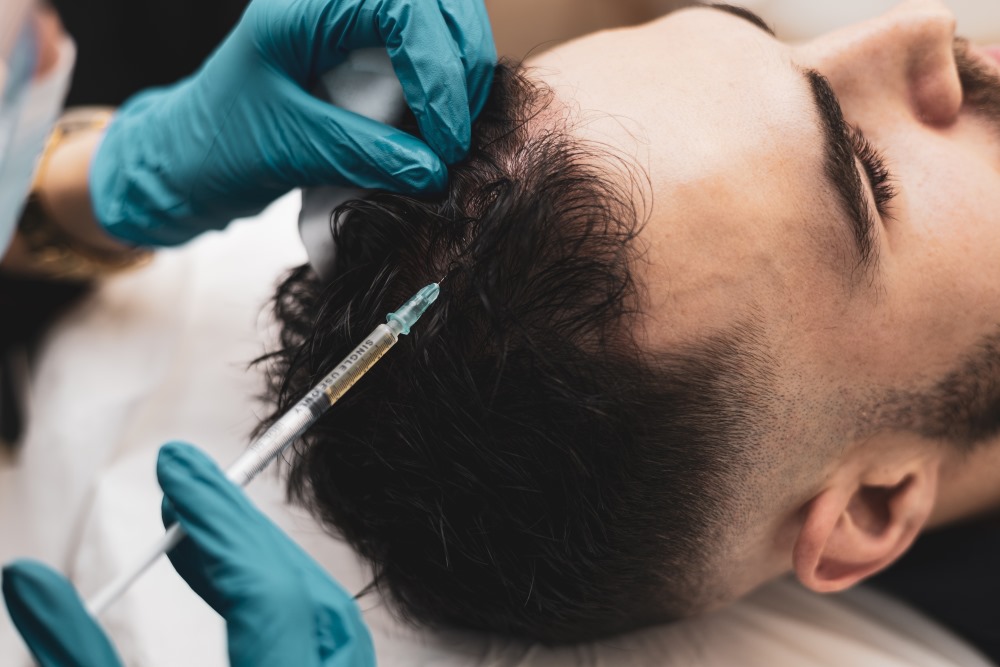How Long Do the Results of PRP Hair Restoration Treatments Last?

It is distressing when people start losing their hair as it can make them both look and feel unattractive, and apart from the overall outlook, it lowers self-esteem and confidence. It is for this reason that Platelet-Rich Plasma hair restoration has become so famous among people who seek solutions for hair restoration. Non-surgical PRP hair restoration therapy simply utilizes the body’s natural healing powers to stimulate hair growth through the action of natural blood-borne growth factors. However, most patients have one question in mind: how long does the outcome of PRP hair restoration treatments last? The nature of PRP treatments, including how long the results are expected to last, are discussed in this article.
Understanding PRP Hair Restoration Treatment
PRP hair restoration is a three-stage process initiated by drawing a small quantity of the patient’s blood. The blood is then passed through a centrifuge, separating the platelet-rich plasma from the red blood cells and other components. The extracted PRP is then filled with growth factors and injected into the scalp at the sites of hair thinning or loss. According to theory, the growth factors within PRP stimulate activity in hair follicles and promote scalp blood flow, thus facilitating new hair growth.
PRP treatments must be provided by a dermatologist or specially trained professional. The procedure itself is generally well-tolerated and requires only minimal downtime. The area of the injections can be slightly tender or swollen; however, most side effects do not last for extended periods.
How Soon Does PRP For Hair Restoration Start to Work?
The results from PRP hair restoration treatments may be quite varied among individuals, depending on a number of factors, which include the extent of one’s hair loss, the response of the individual to the treatment, and the periodic repetition of the procedure.
Improvements can start to be seen early by patients within three to six months following the initial PRP session. This may include thicker hair, less shedding of hair, and even new hair growth in areas that have thinned out. Realistic expectations are important, though; one must remember it is not magic. Hair grows very slowly, and one needs to be a little patient.
How Long Do the Results from PRP Hair Restoration Last?
PRP hair restoration results are not permanent. Actually, most people experience peak results from PRP hair restoration treatments for about six months to a year after a succession of PRP treatments. Since individual factors will influence the length of time that the results last, it is important to understand that it is not a one-size-fits-all process and that each individual is different.
Some things to keep in mind include:
Frequency of Treatments
Treatments with PRP are generally administered in a series of injections, often recommended every four to six weeks for the first three to four sessions. After this initial series of treatments, maintenance treatments can be performed every six to twelve months in order to sustain results. Consistent follow-up is critical in prolonging the benefits of PRP therapy.
Individual Variation
Everyone’s biological response to PRP might be different. Genetics, general health, and hormonal levels are a few factors that could influence how well the body will take to the treatment and the length of the results.
Extent of Hair Loss
Early thinning may thus give longer efficacy compared to those who have extensive hair loss. The responsiveness of your hair follicles is usually determined by their condition.
How to Maintain Results
There are some ways that will ensure that the results of PRP hair restoration last for a longer period:
Lifestyle Modifications
Lifestyle modifications include a balanced diet, regular exercises, and sufficient hydration that can contribute to a healthy state of well-being and, at the same time, may increase the effectiveness of PRP therapy. General nutrition for hair is mainly based on vitamins A, C, D, and E, and minerals highly needed by the hair include zinc and iron.
Scalp Care
Good scalp hygiene and health are important. Gentle, regular cleaning of the scalp will help, along with the appropriate hair care products, in the growth of hair and overall success of the PRP treatments.
Supplements
Nutritional supplementation to help in the health of the hair may be beneficial for certain patients. Consultation with a healthcare professional will provide appropriate guidance.
Managing Stressors
Stress is considered one of the factors contributing to hair loss. Practicing stress-reduction techniques, such as mindfulness, yoga, or therapy, could effectively help manage hair health.
If you are interested in learning more about PRP hair restoration treatments, call the office of Dr. Ghozland today at 310-393-9359 and we will be happy to help!
